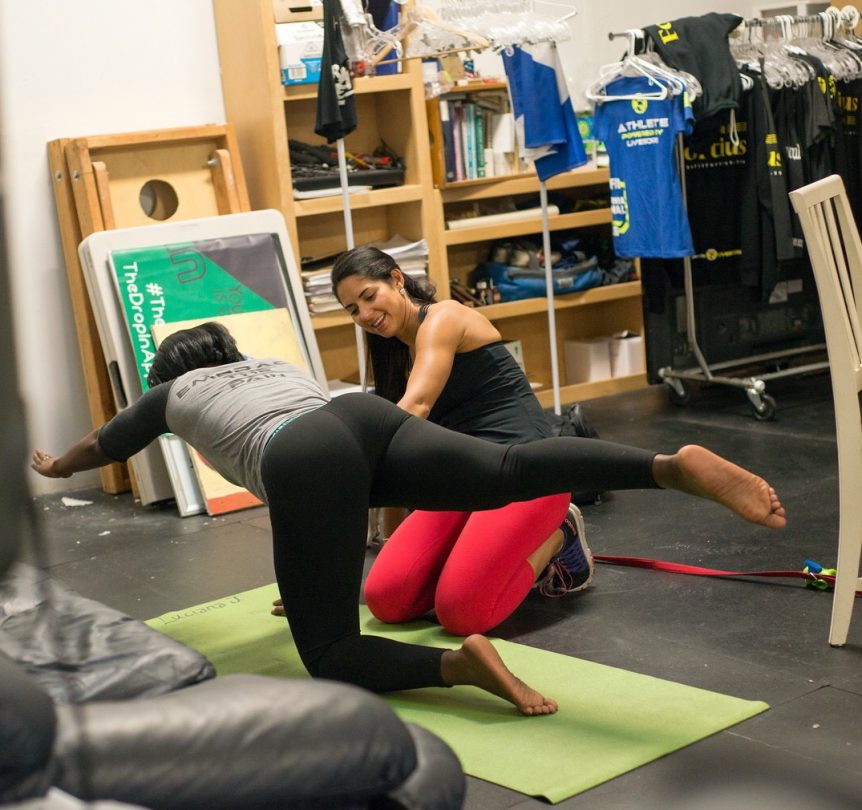We know that trainers and coaches help people achieve a specific fitness goal, are generally fit themselves, and maybe, just maybe, they can tell you exactly how to lose that jiggle under your arms once and for all! But what the heck is the difference?
This is a good question….but also the wrong question to ask because it really doesn’t matter. I admit to using the words “trainer” and “coach” interchangeably, but I also understand that it’s human nature to want to categorize people. It helps us quickly assess what one stands for or does for a living. A coach might convey sports-specific training, perhaps surrounded by grunting, sweaty players on a field. Trainers convey buff bodybuilders walking around the gym training regular folk and teaching them to be buff and hot.
These ideas aren’t wrong per say, but they don’t paint the whole picture of what a fitness professional is. In the fitness industry, the terms “trainer” and “coach” often implies what type of certification one has and which population s/he trains. For example, strength coaches are known to train athletes while an Olympic weightlifting coach focuses specifically on the sport of weightlifting. They still train people, they still make them buff and hot, and every single one is responsible for program design.
The better question is then “What is the difference between a good coach [or trainer] and a bad coach [or trainer]?” For speciality’s sake, let’s just call all fitness professionals “coaches” and move on with this post, shall we?
Great.
Knowing the difference between a good coach and a bad coach has serious implications on your training. Just because someone is in great shape, loves working out, and has a million Instagram followers doesn’t mean you should seek their advice on training. Nor should you work with someone simply because of the number of certifications he or she owns. Certs are nice, but they don’t tell us much about someone’s character.
The Difference Between a “Good Coach” and “Bad Coach”
A bad coach tells you which exercises to do.
A good coach instructs you on how to move.
A bad coach counts reps.
A good coach cues.
A bad coach stands in one spot with arms crossed while you exercise.
A good coach moves around like a shark (great quote from Tony Gentilcore!), observing your movement from every angle and assessing as you go.
A bad coach points out everything you did wrong so you feel defeated at the end of the workout.
A good coach points out what you did well and gives you one thing to focus on to help you improve.
A bad coach forces you into a movement you haven’t earned or are not physically ready for.
A good coach tests your ability and then problem solves on the spot to make you and the exercise more successful.
A bad coach starts a session with “What do you want to work on today?”, indicating he or she will simply wing it for today.
A good coach starts every session asking “How is your body feeling today?” knowing that your feedback will have an impact on the program he or she has already designed in advance.
A bad coach wants you to know as little as possible about health, fitness and your body so that you always “need” him or her.
A good coach educates you so eventually, you don’t need him or her.
A bad coach uses client sessions to show off his or her own skills, not to improve yours.
A good coach adjusts his coaching style to the individual and always remains focused on the client, not himself, during the session.
A bad coach likely starts every warm-up the same way – a walk or jog on the treadmill.
A good coach leads you through a dynamic warm-up, breathing drills and movement prep before diving into the workout.
A bad coach leaves you lifeless in a pool of sweat and calls it “a great workout”.
A good coach leaves you feeling accomplished rather than depleted.
A bad coach lives for the feedback “I was so sore I could barely move” every time.
A good coach expects soreness but understands this is never the goal.
A bad coach shows off his or her knowledge with fancy words and science.
A good coach explains everything in plain English so you understand.
A bad coach doesn’t know why he’s selected a certain exercise or designed a program a particular way.
A good coach can explain the “why” behind every exercise, rep scheme and rest period (in case you ask).
A bad coach pretends to know all the answers.
A good coach is okay saying “I don’t know, but let me find out.”
A bad coach blames the client if the results are less than expected.
A good coach looks to his peers and mentors for advice to help a client adhere to a program and get results.
A bad coach finds continuing education expensive and indulgent.
A good coach devours everything he or she can to improve as a coach, including the occasional paid seminar, workshop, or conference.
A bad coach only hangs out with other trainers.
A good coach seeks out mentors from fields outside of fitness.
A bad coach reads body building and mainstream magazines or websites for ideas and education.
A good coach reads up on business, psychology, behavioral economics, nutrition and fitness to improve the client’s entire experience.
A bad coach hoards his knowledge.
A good coach is generous with his time and gives back to clients and the industry with valuable content.
A bad coach trains others the way he or she prefers to train him or herself.
A good coach trains clients based on the individual’s specific needs and goals.
We All Start Off Bad
One thing I can assure you is that every fitness professional starts off in this “bad coach” category. We have little experience, little knowledge, we likely don’t understand how behavior change and psychology plays into our work and how it can help you get better. But the difference between a good and bad coach is that the good one chooses to move beyond that phase and humbles him or herself to get to the next phase.
Whether one chooses to call him or herself a personal trainer, a coach, a celebrity trainer or world-class ninja is irrelevant. It all comes down to what kind of fitness professional you want to become for the betterment of your clients and the world around you.
Ya dig?


Comments 2
The ability to care.
Absolutely! Can’t put a price on that.